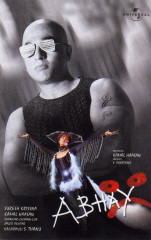
 |
 “Padmashree” Kamal Haasan is known for being unconventional. The characters he has essayed, the films he has produced, and even the one he directed, “Hey Ram” have all dared to be different. Returning this time with “Abhay,” one of the most hyped movies of the year, this legend, this “demi-god” blunders by being a bit too different. He has guts no doubt. Any person who is willing to spend 250 million rupees on a film (a very high budget for an Indian production) that cannot appeal to any audience at all, really must have some guts!
The film falls flat on its face because of its failure in the two most important departments of filmmaking – scriptwriting, and direction. Initially, the scenes after which “Abhay” gets high on drugs and hallucinates are quite interesting. The use of animation in exposing his mind frame and his naked savagery when he kills is indeed well executed. However, Kamal makes the same mistake he has made time and again in so many of his films – he overdoes it. While one ten minute long hallucinatory sequence is bearable, doing the same thing twice after that, and that too with a little musical number imbedded in one of them, is really testing the audience’s patience. Among the positive aspects of the film is the action. From the commando operation in the beginning to the car chase and to the final scenes where Abhay jumps off the building on a hot air balloon are all slickly mounted. The special effects by the Australian company, Cutting Edge are also worth a mention. In the fight scenes, and the scenes showing both Abhay and Vijay in the same frame, they have discarded the traditional morphing technique to increase the believability of the interplay between the two characters. Cinematography by S. Thiru provides the necessary gloss that such scenes need. Editing is slick at times, and invisible at others. While making a film such as this, editing should be used to thrill and accentuate the narrative pace. However, when the director would devote so much unnecessary time to hallucination and banal glorification of a drug-addicted psychopath, one can’t really blame the editor for his shortcomings.
Finally, the performances are worth a mention. Kamal as always excels ensuring that he appears in literally every single shot. His performance as Abhay is impressive initially but plays the monotonous tune post interval. Raveena Tandon as Tejwaswini also plays her miniscule role with conviction. Kitu Gidwani as the stereotypical, evil step-mother, and Milind Gunaji as Abhay and Vijay’s father are passable. Manisha Koirala makes a completely, inexplicable, pointless special appearance. While one can sit through the Zingoria dance, her squealing in a pathetic, artificial Americanized accent is simply intolerable. A film like “Abhay” has never been made before in India. Sure, we have seen psychopaths, and we have seen stories of twins out to kill each other. But never has someone actually told such a story from the point of view of a psychopath. Never has a filmmaker attempted to delve so intricately into the dark psyche of a killer. “Abhay” does all these things but fails simply because it does too much of it. It is an overdose of self-indulgence that drives its viewer crazy. “Abhay” will find it very difficult to find itself an audience. While the possibility of children and the conservative watching this movie can be ruled out, it would be safe to say that so can the possibilities of the mentally sane. It almost seems as if Kamal Haasan and Suresh Krishna were high on drugs while making this film.
|
| Comments | Contact Us | Advertise | Terms of Service | Privacy Policy |